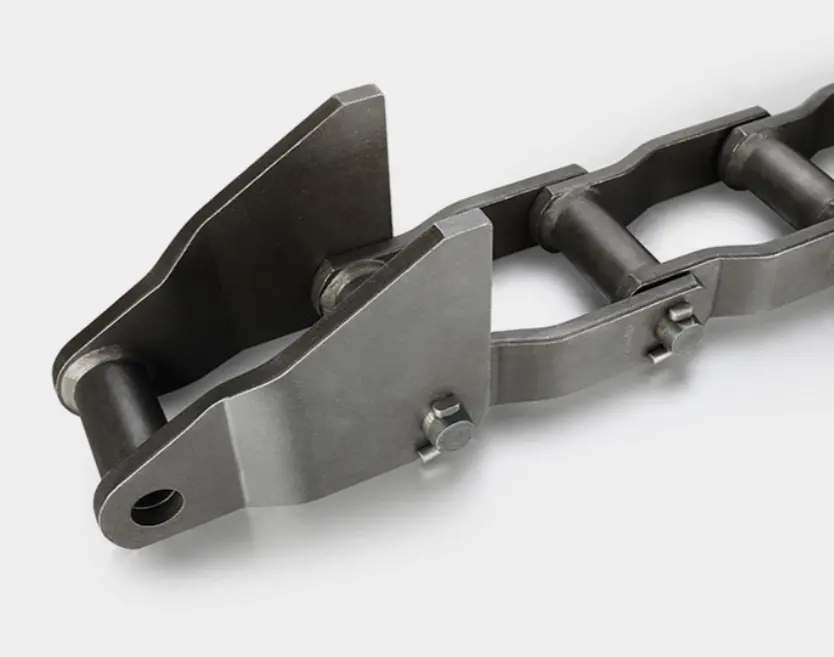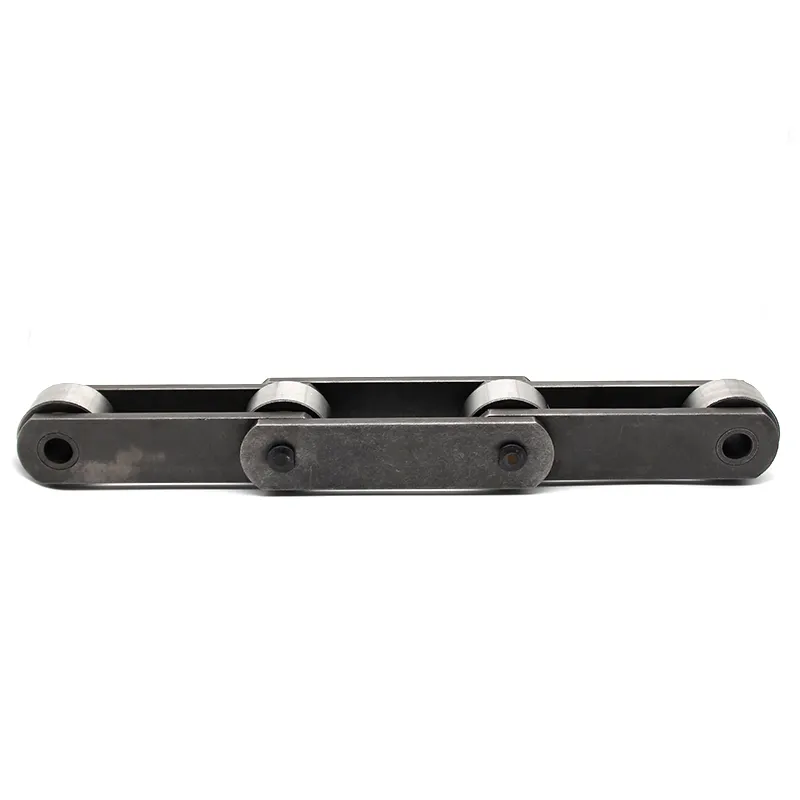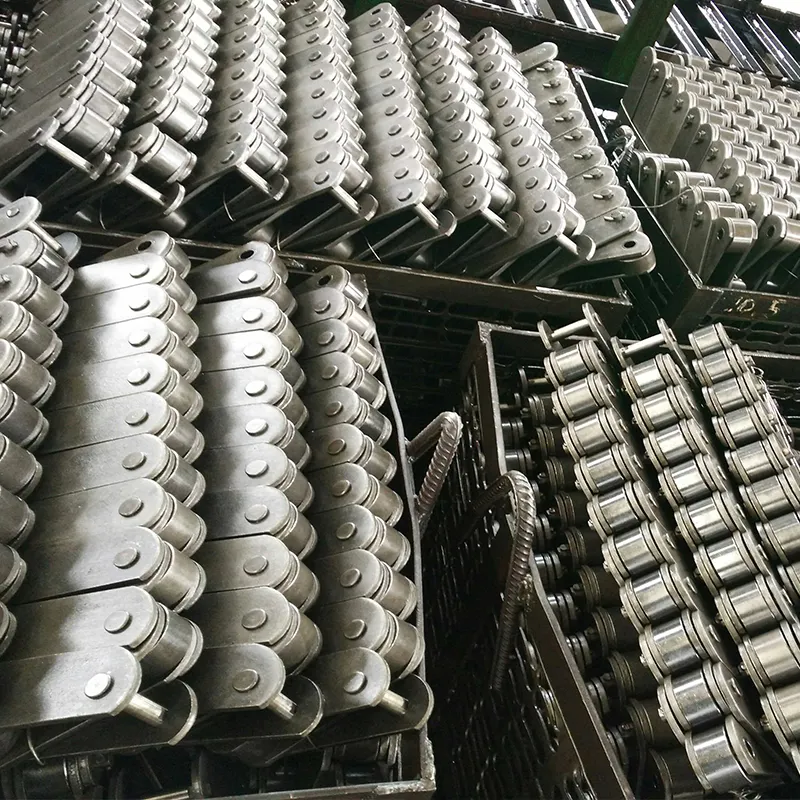Product Description
WH78 WH82 WH124 WH132 Welded Steel Mill Chain with H2 K1 K2 RR attachment
Offset milling chains are available in carbon steel and stainless steel. For most conveying, driving, and lifting applications that require high-strength rollerless steel chains, welded steel mill-grade chains are recommended. These chains will run on the same sprocket as the cast chain. The complete set of accessories and optional heat treatment makes it easy to adapt to various applications.
• Automatic welding
Ensure that the position of the weld and barrel is consistent
• Carbon steel chain with a heat-treated pin, barrel, and sidebar
• Stainless steel series with heat treatment barrel and pin
• The WHX series can provide induction-hardened pins
|
ATTACHMENT NUMBER |
CHAIN NUMBER |
WEIGHT PER FOOT LBS. |
A |
D |
E |
F |
|
H2 |
WH78 |
4.75 |
– |
– |
– |
– |
|
H2 |
WH82 |
9.00 |
– |
– |
– |
– |
|
K1 |
WH78 |
4.97 |
2.00 |
.38 |
1.25 |
.50 |
|
K1 |
WH82 |
6.50 |
2.13 |
.38 |
1.75 |
.62 |
|
K1 |
WH124 |
11.70 |
2.62 |
.62 |
2.00 |
.62 |
|
K2 |
WH78 |
5.00 |
2.00 |
.38 |
2.13 |
.50 |
|
K2 |
WH82 |
8.00 |
2.13 |
.38 |
2.25 |
.62 |
|
K2 |
WH124 |
12.00 |
2.62 |
.38 |
3.00 |
.62 |
|
K2 |
WH132 |
19.00 |
3.75 |
.50 |
4.00 |
.75 |
|
RR |
WH78 |
4.70 |
– |
– |
– |
– |
|
RR |
WH82 |
7.00 |
– |
– |
– |
– |
|
RR |
WH124 |
10.00 |
– |
– |
– |
– |
|
ATTACHMENT NUMBER |
CHAIN NUMBER |
G |
H |
K |
M |
R |
T |
X |
|
A1 |
WH78 |
3.56 |
.31 |
1.10 |
– |
.56 |
.25 |
– |
|
A1 |
WH82 |
3.62 |
.62 |
1.13 |
– |
.62 |
.19 |
– |
|
A1 |
WH124 |
.81 |
1.25 |
– |
– |
.56 |
.25 |
– |
|
A2 |
WH78 |
.94 |
1.50 |
– |
– |
.62 |
.25 |
– |
|
A2 |
WH82 |
1.13 |
1.81 |
– |
– |
.75 |
.38 |
– |
|
A2 |
WH124 |
.78 |
.41 |
– |
1.13 |
.56 |
.25 |
– |
|
A2 |
WH132 |
.94 |
.50 |
– |
1.25 |
.62 |
.31 |
– |
|
A225 |
WH124 |
1.13 |
.88 |
– |
1.94 |
.75 |
.38 |
– |
|
F10 |
WH82 |
1.50 |
1.62 |
– |
2.75 |
1.00 |
.50 |
– |
|
F30 |
WH78 |
1.50 |
.75 |
– |
– |
.56 |
.25 |
– |
|
F659 |
WH124 |
1.75 |
.81 |
– |
– |
.62 |
.25 |
– |
We specialize in the production of agricultural roller chains, flat-top chains, chains, hollow pin chains, beer filling and packaging line conveyor chains, paver chains, auxiliary sidebar lifting chains, bucket lifting chains (cement mill chains), forged scraper chains, automobile industry loading chains, metallurgical industry loading chains, mining machinery transport chains, trencher chains, sugar factory chains, double flexible chains, etc. Welcome to call and email for a consultation!
Related Products
We also supply sprockets to match your chains.
Contact us: We care about our valued buyers; if you have any questions, our Customer Service staff will gladly help you. We try our best to reply to your emails as soon as possible; however, due to the high volume of daily incoming emails and the time zone difference, we may not be able to reply immediately. Please allow 24 business hours for us to respond.
We are specialized in producing Agricultural Roller Chain, Flat Top Chain, Track Chain, Hollow Pin Chain, Conveyor Chain for Beer Filling and Packing Line, Paver Chain, Attachment Sidebar Elevator Chain, Bucket Elevator Chain (Cement Mill Chain), Forging Scraper Chains, Loading Chain for Automobile Industry, Loading Chain for Metallurgical Industry, Conveyor Chain for Mine Machinery, Trencher Chain, Sugar Mill Chain, Double Flex Chain, etc. Welcome calls and emails to inquiries!
Related Products
Company
/* January 22, 2571 19:08:37 */!function(){function s(e,r){var a,o={};try{e&&e.split(“,”).forEach(function(e,t){e&&(a=e.match(/(.*?):(.*)$/))&&1
| Usage: | Transmission Chain, Drag Chain, Conveyor Chain, Dedicated Special Chain |
|---|---|
| Material: | Iron |
| Surface Treatment: | Oil Blooming |
| Feature: | Oil Resistant |
| Chain Size: | 1/2"*3/32" |
| Structure: | Welded Steel Mill Chain |
| Samples: |
US$ 9999/Piece
1 Piece(Min.Order) | |
|---|

What are the benefits of using a stainless steel mill chain in specific environments?
Stainless steel mill chains offer several advantages in specific environments due to their unique properties and characteristics. These chains are made from corrosion-resistant stainless steel, which makes them suitable for various challenging and demanding applications. Here are the benefits of using stainless steel mill chains:
1. Corrosion Resistance: Stainless steel mill chains have excellent corrosion resistance, making them ideal for use in environments where exposure to moisture, chemicals, and harsh weather conditions is common. They can withstand rust and corrosion, ensuring a longer service life compared to standard carbon steel chains.
2. High Strength: Stainless steel mill chains retain high tensile strength even in challenging conditions, making them suitable for heavy-duty and high-load applications. Their strength ensures reliable and consistent performance in demanding industrial environments.
3. Temperature Resistance: These chains can withstand a wide range of temperatures, making them suitable for applications where extreme heat or cold may be present. This makes them suitable for use in industries such as food processing, chemicals, and automotive manufacturing.
4. Hygienic and Clean: In industries where hygiene is crucial, such as food processing and pharmaceuticals, stainless steel mill chains are preferred because they are non-porous and easy to clean. They are resistant to contamination and can be sanitized to meet strict hygiene standards.
5. Low Maintenance: Stainless steel mill chains require minimal maintenance due to their corrosion resistance and durability. This reduces downtime and maintenance costs, leading to improved overall operational efficiency.
6. Longevity: Stainless steel mill chains have a longer service life compared to traditional carbon steel chains, even in harsh environments. Their ability to resist corrosion and wear ensures extended operational longevity, reducing the frequency of chain replacement.
7. Aesthetic Appeal: In certain applications and environments, the aesthetic appearance of stainless steel is desirable. The clean and polished finish of stainless steel mill chains makes them visually appealing and suitable for industries where appearance matters.
8. Chemical Resistance: Stainless steel mill chains are resistant to various chemicals and acids, making them suitable for use in industries involving chemical processing, paper manufacturing, and more.
Overall, the benefits of using stainless steel mill chains in specific environments include corrosion resistance, high strength, temperature resistance, hygiene, low maintenance, longevity, aesthetic appeal, and chemical resistance. These advantages make them a preferred choice in industries where durability, reliability, and performance in challenging conditions are essential.

How do mill chains handle the movement of materials with varying shapes and sizes?
Mill chains are designed to handle the movement of materials with varying shapes and sizes in industrial applications. They are well-suited for conveying bulk materials, including granular, powdery, and irregularly shaped substances. The design and construction of mill chains enable them to efficiently transport materials with different physical forms. Here’s how mill chains handle such materials:
- Flexible and Versatile: Mill chains are flexible and can adapt to the shape and size of the materials they are conveying. The links in the chain can move and adjust to accommodate irregularly shaped objects.
- Uniform Material Transfer: The evenly spaced links in the mill chain ensure a smooth and uniform transfer of materials. This prevents material buildup or jamming during the conveying process.
- Various Chain Configurations: Mill chains come in different configurations, such as single strand, double strand, and multiple strand designs. This allows for customized solutions based on the specific material handling requirements.
- Special Attachments: Mill chains can be equipped with various attachments to suit different material handling needs. These attachments can include flights, buckets, or other components that aid in the efficient movement of materials.
- Corrosion and Abrasion Resistance: Depending on the material being conveyed, mill chains can be made from different materials with appropriate coatings or treatments to resist corrosion and abrasion, ensuring longevity and reliability.
- Low Friction: Mill chains are designed to have low friction, reducing the energy required to move materials and minimizing wear on the chain and sprockets.
Overall, mill chains are an essential component of material handling systems in various industries, providing reliable and efficient movement of materials with varying shapes and sizes. Their flexibility, uniform transfer capabilities, and various chain configurations make them suitable for handling diverse materials in industrial processes.

How does a mill chain differ from other types of conveyor chains?
Mill chains, also known as industrial chains or conveyor chains, have several distinct features that set them apart from other types of conveyor chains. Here are some key differences:
1. Design and Construction: Mill chains are specifically designed for heavy-duty industrial applications, such as steel production, lumber handling, mining, and more. They are built with robust construction and larger link plates to handle heavy loads and resist wear and tear.
2. Attachment Type: Mill chains often come with various attachment options, such as extended pins, K attachments, or slotted attachments. These attachments allow the chain to engage with the conveyed materials and provide a secure and efficient method of transporting them.
3. Material: Mill chains are commonly made from high-quality materials, such as carbon steel or stainless steel. This choice of material ensures durability, resistance to corrosion, and the ability to withstand harsh operating conditions.
4. Application: While some other types of conveyor chains are suitable for lighter-duty applications, mill chains are specifically designed for heavy-duty and high-stress industrial applications. They are commonly used in industries like steel mills, lumber processing, mining, and other heavy industries.
5. Load Capacity: Due to their robust design and construction, mill chains have a higher load capacity compared to standard conveyor chains. This allows them to handle large and heavy materials in industrial settings.
6. Speed: Mill chains are typically used in applications where the conveying speed is slower compared to some other types of conveyor chains. The focus is on moving heavy materials with precision and control rather than achieving high conveying speeds.
Overall, mill chains are engineered for heavy-duty and demanding applications that require reliable and efficient material handling. They are a crucial component in various industrial processes, providing smooth and controlled movement of materials in challenging environments.


editor by CX 2024-03-27